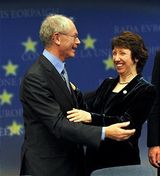 Among a batch of unpopular blogposts, this is the one that will get Coffee Housers to grab their pitchforks and hunt me down. Because I think the appointments of Belgium’s Herman Van Rompuy, as president of the European Council, and Britain’s Catherine Ashton, as EU “high representative” for foreign affairs, are not bad at all.
Among a batch of unpopular blogposts, this is the one that will get Coffee Housers to grab their pitchforks and hunt me down. Because I think the appointments of Belgium’s Herman Van Rompuy, as president of the European Council, and Britain’s Catherine Ashton, as EU “high representative” for foreign affairs, are not bad at all.
First, I have to eat my words. I thought Gordon Brown would fail to shoehorn a Briton into a top EU job. Credit goes to him and Britain’s diplomats, chiefly Kim Darroch, the UK’s Permanent Representative in Brussels. Diplomacy is the art of the possible. Brown did what he should have done: he pushed Blair but switched horses when necessary and secured a key job for Britain. So well done.
Then a word on the Rompuy-Ashton team. I don’t agree with Mr. Van Rompuy on a number of issues, including tax harmonisation and Turkey’s future links with the EU. He has federal sympathies; I do not. But given what we know about his career, and the way that decision-making works among EU states, Van Rompuy is likely to subordinate his own views to the consensus. The British government, supported by the new EU members, insisted on keeping the national veto for all tax matters in the EU’s constitutional treaty. The provision survived into the Lisbon Treaty. So, I am not too worried on that score.
And what of Lady Ashton? Like many other European foreign ministers (Straw, Miliband, Genscher, Hague) she may have had little traditional foreign policy experience until now, but in the last 13 months she has spoken with the authority of the 27 states on the issue where the EU is already a superpower: trade. The step to a broader role is less dramatic than it would have been for many others. True, David Miliband would have shone more brightly, George Robertson spoken with more gravitas and Peter Mandelson acted with more deadly charm. But whether they would have been able to bring the 27 EU states along is less clear.
And that is the key point. The EU is not a state and should not become one, replete with directly elected leaders who espouse a vision that defies the will of the democratically-elected European governments. If that needed saying to diehard federalists or paranoid euro-skeptics, the German Constitutional Court recently did, ruling that the Lisbon Treaty does not transform the EU into a federal state and that such a transformation would violate German constitutional law. Instead, the EU should continue its development into a never-before seen system of governance that respects the differences and viewpoints of the 27 EU states, yet seeks to develop a joint approach to common challenges.
President-elect Van Rompuy and Lady Ashton seem well-placed to build consensus among EU states for such a system. Chosen unanimously, and representing The Right and the Left, the Rompuy-Ashton team are more likely to bring EU governments, European legislatures and the European Parliament with them than Tony Blair or Massimo D’Alema would have. And who, after all, can (without recourse to Google) name the first EU Commission president, the first NATO Secretary-General or even the first UN Secretary-General?






Comments